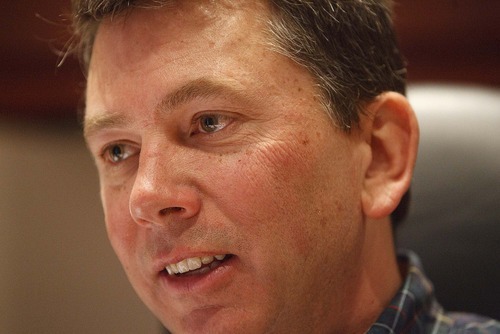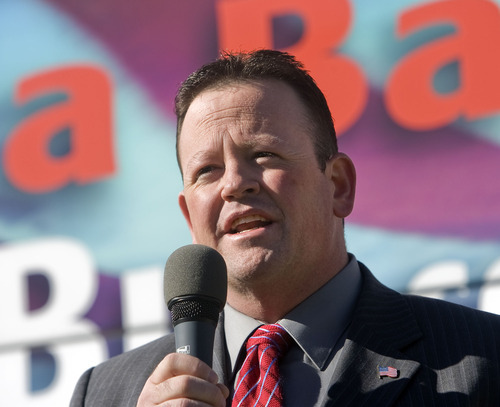This is an archived article that was published on sltrib.com in 2011, and information in the article may be outdated. It is provided only for personal research purposes and may not be reprinted.
Rep. Carl Wimmer said Monday he was caught off-guard upon hearing Rep. Stephen Sandstrom was challenging him for Utah's 4th Congressional District seat, setting up a clash between two founding members of the conservative Patrick Henry Caucus at the Republican convention next April.
"I am a little surprised that he hadn't even called me to tell me," Wimmer said. "After all, we are friends and he told me at the Capitol he wouldn't be running in the 4th."
Sandstrom, 47, announced he was running Monday and his campaign already had an electronic billboard up on I-15 in the morning.
The Orem lawmaker said he considered Wimmer a friend and that it was simply logistics that dictated his decision to run in the same district.
"He deserves to be in this race as much as I do, and [voters] should look hard at him or anyone else as much as they do with me," Sandstrom said.
Mia Love, the mayor of Saratoga Springs, is also thought to be weighing a run in the district, but she hasn't officially jumped in yet. The 4th District, roughly handgun-shaped, has an eastern border that runs along I-15 until it opens up just before Nephi. Its western border largely clings to Highway 6.
Wimmer, 36, lives in the district and Sandstrom, who lives about 15 blocks from the district border, will move so he lives in it.
Wimmer said he isn't focused on other candidates — even though it might be hard to ignore Sandstrom, whom he's largely been shoulder-to-shoulder with ideologically during their tenure in the Legislature.
Sandstrom sponsored HB497, Utah's enforcement-only immigration law, and Wimmer was a co-sponsor. Both opposed HB116, the guest-worker law that would allow undocumented immigrants in the state to work provided they paid fines and passed background checks. And both supported the repeal of in-state tuition for undocumented immigrants — though Wimmer's attempt to get that bill passed in the Legislative session never made it to a floor vote.
They also aligned on HB477, a law sponsored by Rep. John Dougall, R-Highland, that sought to make it more difficult for the public to obtain public documents. That law was repealed in a special session called by Gov. Gary Herbert.
Quin Monson, assistant director of the Center of the Study of Elections and Democracy at Brigham Young University, said with two candidates so closely aligned on issues, it could come down to personalities and the speeches they give at the Republican nominating convention April 21.
He said this was how it played out in 2010 when Tim Bridgewater and Mike Lee were battling it out for the U.S. Senate seat — now occupied by Lee.
"What we saw was a significant swing in delegates as well as their perceptions of the equality between the two during the convention speeches," Monson said. "And then in the primary there were a lot of similarities. We came up with precious little to explain the vote between Bridgewater and Lee. We struggled to find out why people voted the way they did. It could've come down to any number of small things."
During the convention, Bridgewater beat Lee 57 percent to 43 percent. But because Bridgewater failed to reach 60 percent, it forced a primary — which Lee won 51 percent to 49 percent.
Thomas Wright, chairman of the Utah Republican Party, said intra-party fights are always uncomfortable and he said he expected the fight for the 4th District would be "hotly contested" and would likely end up in a primary.
"The obvious disadvantage is when you have intra-party challenges that are expensive, you have to fundraise and then turn around and run against a Democrat," Wright said. "The other part of it is that these races can be hotly contested and can turn slightly negative and can be damaging for them in a general election."
Matt Lyon, executive director of the Utah Democratic Party, said there are some candidates in the party that are interested in running in the 4th District — though there is a lot riding on where U.S. Rep. Jim Matheson ends up running.
But Lyon said Wimmer and Sandstrom are too extreme for most voters.
"I think they're far, far right and out of touch with the voters of Utah," Lyon said. "People say we're a conservative state, but we're a moderate right state in general, and I think Wimmer and Sandstrom are far outside what Utahns will go for."
The battle also has caused great consternation for allies of the two.
Rep. Chris Herrod, R-Provo, endorsed Wimmer and, as a founding member of the Patrick Henry Caucus, said it is difficult to see two friends and political allies battle it out for the same seat.
Herrod noted that when the district boundaries were drawn for state lawmakers, he was placed into the same district as Sandstrom and would've been forced to run against him. Herrod, who is considering a run against Sen. Orrin Hatch, said he will stick with Wimmer in this race, however.
"It's unfortunate when a friend is running against a friend," Herrod said. "But I kind of made a commitment, so that's where I'm at."
Twitter: @davemontero





